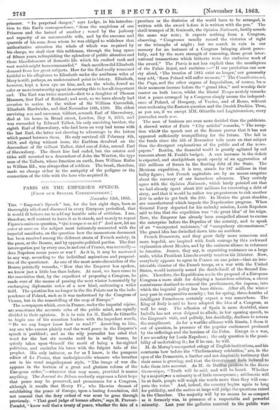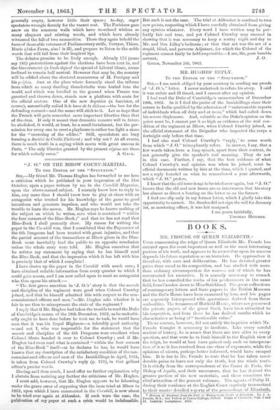PARIS ON THE EMPEROR'S SPEECH. [FROM OUR SPECIAL CORRESPONDENT.]
November 12th, 1863. THE " Emperor's Speech " has, for the last eight days, been so thoroughly sifted and discussed in every European periodical, that it would ill behove me to add my humble mite of criticism. I am, therefore, well content to leave it as it stands, and merely to repeat Figaro's ominous question, " Qui trompe-t-on ici ?" And now, let me enter at once on the subject most intimately connected with the imperial manifesto, on the question how the momentous document has been received among the different strata of French society, in the press, at the Bourse, and by opposite political parties. The first interrogation put by every one, in and out of France, was naturally— does Napoleon mean peace or war ? As it is, it may be answered in any way, according to the individual aspirations and propensi- ties of the questioner. As one of the most acute chroniclers of the Bourse pointedly remarks, " Now that the Emperor has spoken, we know just a little less than before. At most, we have come to the conviction that, by the expedient of proposing a Congress, he made sure of the means of passing the next winter honourably by exchanging diplomatic notes of a new kind, embracing a wider field. The question lies no longer in the Six Points nor in the inde- pendence of Poland, such as it was understood by the Congress of Vienna, but in the remodelling of the map of Europe."
The newspapers which, even in France, under the imperial regime, are sometimes the accurate echo of the public mind, are equally divided in their opinions. It is in vain for M. Emile de Girardin to begin one of his sensation leaders with the impudent words, " Do we any longer know how to read ?" According to him, any one who cannot plainly read the word peace in the Emperor's speech is purblind ; and as the wily journalist has cried that word for the last six months until he is sadly hoarse, he quietly takes upon *himself the merit of being a far-sighted politician, and encircles his brow with the fulgent halo of the prophet. His only imitator, as far as I know, is the pompous editor of La France, that undecipherable wiseacre who breathes out in his usual magniloquent style, " The image of war dis- appears in the horizon of a great and glorious reform of the European order,"—whatever that may mean, provided it means anything. The Journal des Debats modestly expresses a faint hope that peace may be preserved, and pronounces for a Congress, although it recalls that Henry IV., who likewise dreamt of establishing the peace of Europe, upon a lasting foundation, did not conceal that the fiery ordeal of war must be gone through previously. " That good judge of human affairs," says M. Prevost- Paradol, " knew well that a treaty of peace, whether the fate of a
province or the -destinies of the world have to be arranged, is written with the sword before it is written with the pen." The shrill trumpet of M. Gueroult, the Opinion Nationale, lustily sounds the same war note ; it expects nothing from a Congress, observing, " Congresses usually record the victories of right or the triumphs of might ; but we search in vain in our memory for an instance of a Congress bringing about peace- fully, and by the mere strength of reasoning, those great inter- national transactions which hitherto were the exclusive work of the sword." The Patrie is not less explicit than the mouthpiece of the Palais Royal, and exclaims :—" If our patriotism can now cry aloud, The treaties of 1815 exist no longer,' our generosity may add, ' Soon Poland will suffer no more.'" The Constitutionnel, the Pays, and the other organs of Imperialism, of course, bu:n their nauseous incense before the " grand idea," and worship their master on both knees, whilst the liberal Temps acutely remarks that a peace arranged by a Congress simply means the independ- ence of Poland, of Hungary, of Venice, and of Rome, without even reckoning the Eastern question and the Danish Duchies. Thus, as you see, if we except MM. Girardin and Lagueronniere, every journalist reads war.
The men of business are even more decided than the publicists. A shrewd writer of Paris " City articles" remarks, " The recep- tion which* the speech met at the Bourse proves that it has not appeared sufficiently tranquillizing for the future. The fall in the funds since the 5th of November tells more on that subject than the divergent explanations of the public and of the news- papers." Besides, the financial world is greatly agitated by sad rumours about M. Fould's budget. A vast increase in the deficit is expected, and stockjobbers speak openly of an aggravation of 350 millions of francs in the floating debt of the State. The Mexican expedition, it is true, stands for 187 millions in that bulky figure ; but French capitalists are by no means sanguine about the recovery of our hazardous advances. They entirely agree with the Opinion Nationale, which lately pointed out that we had already spent about 200 millions for recovering a debt of sixty, and that it would be rather too preposterous to risk another 500 iu order to get back the 200. In Mexico the great shackles are manufactured which impede the Napoleonian progress. When General Forey departed for his unlucky mission, Louis Napoleon said to him that the expedition was " the great idea" of his reign. Now, the Emperor has already been compelled almost to excuse the enterprise before the Deputies of the country, and to speak of an "unexpected resistance," of "compulsory circumstances." The grand idea has dwindled down into an accident.
French Democrats, and they grow daily more numerous and more hopeful, are inspired with fresh courage by this awkward explanation about Mexico, and by the ominous silence in reference to America. Juarez, they say, is organizing resistance on a large scale, whilst President Lincoln overtly receives his Minister. Now, everybody appears to agree in France on one point—that an irre- trievable disaster of the French troops, or a war with the United States, would instantly sound the death-knell of the Second Em- pire. Therefore, the Republicans see in the proposal of a European Congress a mere shift for delaying a hazardous solution, a clever contrivance destined to conceal the predicament, the impasse, into which the imperial policy has been driven. After all, the winter may pass in comparative security ; but for spring, three-fourths of intelligent Frenchmen certainly expect a war somewhere. The King of Italy is said to have adopted the idea of a Congress, as well he may. The adhesion of Spain is more doubtful, since Isabella has not even deigned to allude, in her opening speech, to the Empress's visit, and politely, but decidedly, declines to return the compliment. As for a warlike alliance with Russia, I deem it out of question, in presence of the popular excitement produced by the sufferings and the heroism of the Poles. Except in a war, I see no safety for Louis Napoleon ; the only question is the possi- bility of undertaking it ; for if he can, he will.
M. de Morny's unexpected eulogy of English institutions, and his courteous bow before the "Parliamentary celebrities," are, in the eyes of the Democrats, a further and not despicable testimony that their cause is growing, and that the Government feels induced to take them into account. As M. de Doll us predicts in the Revue Germanique, "Truth will be said, and will be heard. Whether by a majoritysor a minority is of little consequence ; arithmetic will be at fault, people will weigh the words more than they will com- pute the votes." And, indeed, the country begins again to long for publicity, and the nation at large will judge the questions raised in the Chamber. The majority will by no means be so compact as it formerly was, in presence of a respectable and powerful minority. Last year the galleries reserved to the public were generally empty, however little their space; to-day, eager spectators wrangle fiercely for the vacant seat. The Parisians gaze anew on the sonorous walls which have re-echoed whilom so many eloquent and stirring words, and which have already witnessed the fall of two monarchies. There they again behold the faces of those able veterans of Parliamentary strife, Berryer, Thiers, Marie (Jules Fevre, alas! is ill), and prepare to listen to the noble words that will fall from their inspired lips.
The debates promise to be lively enough. Already 173 (some say 183) protestations against the elections have been sent in, and the Government (a fresh signof the spread of Liberal ideas), seems inclined to remain half neutral. However that may be, the country will be edified about the electoral manoeuvres of M. Persigny and his prefers. Just at the place where formerly stood the tribune from which so many dazzling thunderbolts were hurled into the world, and which was levelled to the ground when France was garotted and thrown down, stands now a platform with seats for the official orators. One of the new deputies (a barrister, of course), sarcastically called it is bane de is defense—the box for the defending counsel—and the name will stick to it. Let us hope that the French will gain somewhat more important liberties than that of theatres. If only it meant that dramatic censure will in future be abolished, it would, at least, be a small instalment, but the per- mission for every one to erect a playhouse is rather too light a stone for the " crowning of the edifice." Still, speculators are busy forming a Societe de Credit l'heeitral ; and why not ? At all events, there is much truth in a saying which meets with great success in Paris, " The only liberties granted by the present regime are those































 Previous page
Previous page